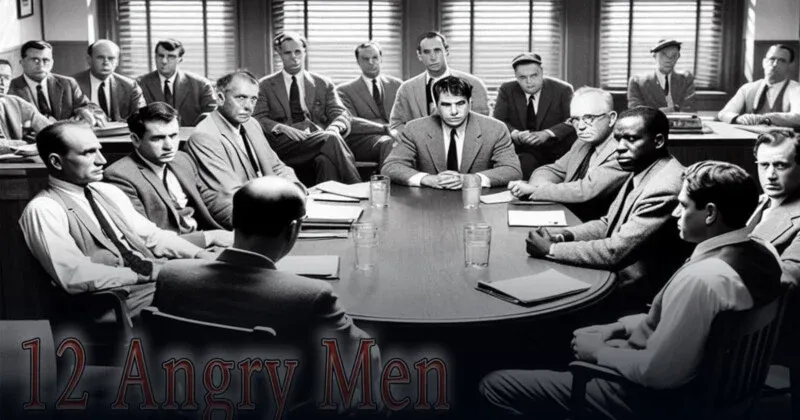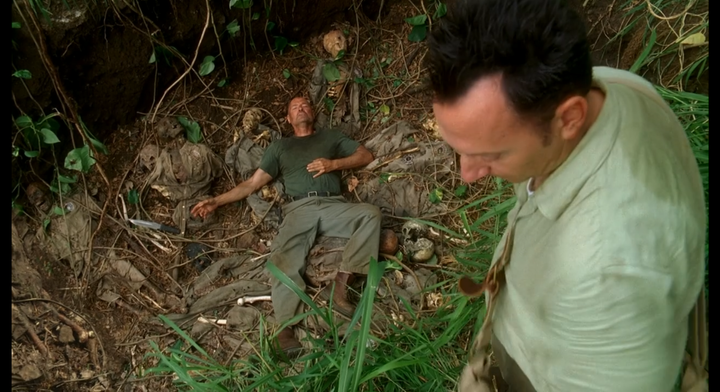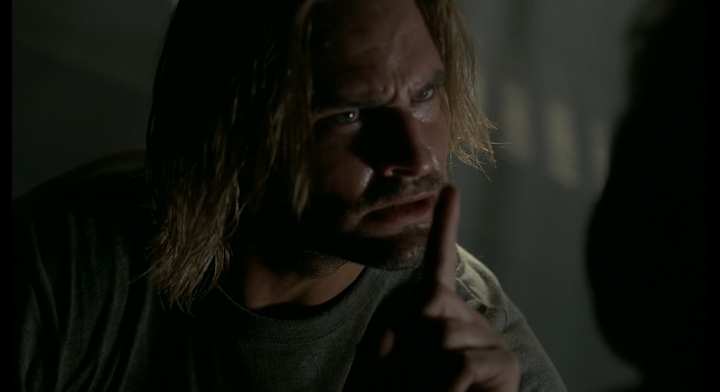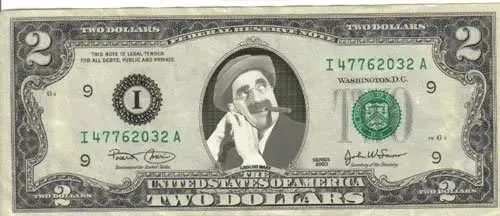The Human Problem
Appreciating human artists in the age of A.I. slop, if you can, and why you should. Identifying the real problem that art machines are meant to solve.

Last week an image went viral online. The image was generated by a computer based one presumes upon images from the classic movie 12 Angry Men. This grotesque thing was attached as a promotional card to a streaming listing on Amazon Prime for that very movie. In case you don't know, 12 Angry Men is a movie that features 12 actors, many of whom have some of the most interesting and expressive features ever committed to celluloid. The image Amazon used to promote this movie extended an image that had already been framed by a master named Sidney Lumet, and the extension ruined the image in order to add nothing. The extended image features 19 figures, many of whom do not appear in the movie and have never appeared anywhere, some of which almost look almost like people. This image added no value, and it was being used for no good reason.
I thought it was a perfect encapsulation of where our dominant cultural narrative has brought us.
It's my personal belief that we create society with our collective beliefs, which inform both collective and individual action, and define what collective and individual actions are even possible.
It's also my personal belief that things that provide positive value to humans are good, and that people who make good things should be compensated for it. I also believe that people should have access to good things whether or not they can pay. This strikes me as an appropriate way to organize society, provided that we collectively believe society is meant to benefit humans rather than money, and that humans—being inherent generators of value and repositories of limitless potential value—deserve the fruits of society even if they can't pay. It's the reason I love libraries, for example.
But I think we all know that our society is organized around different beliefs, a core one being that the purpose of society is to benefit money rather than humans. If you doubt this, I'd invite you to observe all the ways that, for example, libraries are under attack these days. I'd invite you to observe all the ways that people are under attack for inability to pay for things, and how the attack is often more expensive than the lost payment. I'd invite you to recognize how often labor-saving devices don't actually save human society at large any labor, but rather increase profit for a few. I'd invite you to recognize how often labor-saving devices actually remove from increasing numbers of human beings the ability to make a living from their labor, so that people with more money than they can ever use can have even more more-than-they-can-ever-use than they did before.
Another core belief in our dominant societal narrative seems to involve treating human beings as a cost rather than a value, and still another seems to be that human costs should be eliminated, often at a social expense greater than the cost. And these beliefs inform collective and personal beliefs, and define what is possible in our society. They make it possible, for example, for otherwise very nice-seeming people to engage in the most outrageous cruelty and still be credited as nice. I suppose this might be expected in a country founded in human slavery, but it seems to me an inappropriate and unsustainable way to organize a society, and I write rather extensively about why in The Reframe.
The Reframe is a weekly newsletter, which you probably know if you're reading this because ... well, this is it, actually; you subscribed to it, even though you didn't have to. It's totally free for everybody, because I don't want anybody who enjoys my writing but can't afford to pay for it to have to stop enjoying my writing, and I believe that you change society by modeling your personal beliefs and hoping other people will join their similar personal beliefs with your personal beliefs to create a collective belief—which is when a belief can really get cooking, belief-wise.
There's an art to what I do, I think. And I know people find value in it, for the very simple reason that they write me to tell me so, and I am desperately grateful to everyone who does. Yet, despite the art I bring to my writing, our dominant societal beliefs have not changed, and our society has not shifted. From this I must conclude that I am not the one who gets to choose how society is organized, which is among other things a terrible blow to my ego.
However, I do get to choose how The Reframe is organized. So, I make sure The Reframe remains free, and in so doing I extend my trust to everybody. My faith is that if readers find enough value in my work to pay for it and can afford to pay, then they will, and if they do not find value, or cannot afford to pay, they will not.
And look: hundreds of people pay. Some pay a little bit every month. Some pay rather a lot every year. I'm very glad and grateful for all of it, because it means that the trust I extended has been honored. Some stop being able to afford paying and they stop paying, and yet go on enjoying my writing all the same—and I'm also grateful for that, too, because it means that I get to honor the trust that has been extended to me. It's a curious and sort of wonderful thing.
It strikes me that the grotesque picture that gestures toward the general idea of 12 Angry Men points toward a compelling new reason to pay for a free newsletter, to wit: The distribution of human art is mainly controlled by people who create and enforce our unsustainable and cruel dominant cultural beliefs, and there's a very specific problem that people who make money by distributing human art are currently trying to solve.
The problem they are trying to solve is something you'd expect to find in a society whose dominant narrative treats human beings as a cost rather than a value, and seeks to eliminate all costs. The problem they are trying to solve is humans—the existence of humans, I mean. They'd like to solve the human problem by removing humans entirely from the act of creating.
So increasingly, keeping humans involved in art is going to take all of us working together, and trusting each other. A curious and wonderful thing.
Every 3 months I post something suggesting you might want to upgrade your subscription to The Reframe from free to paid, or from paid to a founding membership. And then I explain why you might want to do something curious and sort of wonderful, like pay for a totally free newsletter.
As you might have guessed by now, this is that post, hidden as a real essay through such misleading trickery as (hopefully) enticing prose and a (hopefully) unique point of view accompanied by (hopefully) trenchant insights.
What can I say? I'm a crafty little piggy.
It’s tougher being a creative person than it used to be, I think. Which means, I think, that it's tougher just being a person—for whom among us is not creative?
Humans are generative beings; we generate value simply by being. This is the reason why it is not only so inappropriate to view human beings as a cost to eliminate and a problem to solve, but impractical to the point of being unsustainable. The parable about killing the goose who laid golden eggs was, I think, about more than best practices in domestic avian husbandry.
The people who view humans as a problem to solve have done with art what they usually do: they made a machine that performs some approximation of what humans do, but much faster and more predictably, so that as machine owners they can be paid for owning the machine and profit from the elimination of the cost of humans.
It's worth pointing out that machines are just tools, and tools that do what humans do aren't necessarily a problem—not if the work they do is something that humans would rather not do, and particularly if the value created by the tool is something that goes to lessening human effort and striving and suffering, rather than simply generating money by cutting humans out of the picture. This is why my focus is more on our collective belief than on the tools themselves.
But I think you know well enough what our society does with such tools.
Anyway, now we've got some tools that do the work that humans would do if they didn't have to work—which would be art. It's a sort of perversion, like creating a machine that will engage in loving your children, or will enjoy a pleasant day by the river, so you won't have to.
And it's unsustainable, at a time when we can ill afford unsustainability—because of course it is. An anti-human worldview is not going to see unsustainability as a problem to solve, because unsustainability solves the human problem it is trying to solve, by ridding the world of what it sees as one of its greatest costs—humans.
The people who view humans as a problem to solve have whipped up some machines that take the totality of actual human artistic expression and use it to create the most grotesque regurgitated schlock you've ever seen, and then they point to it, proud as a newly potty-trained toddler, and other people—who have never found any value in human art but do find value in removing humans from the creation of value—all gather around and murmur their appreciation.
Then a bunch of self-professed fans of art—whose main contribution to the proud tradition of art appreciation seems to be expressing how much they hate the artists who make the art they claim to love for challenging their preconceived notions in some way—share the latest slop around, and talk about how amazing it is, and gleefully predict the incipient obsolescence of the human artists they seem to hate so much.
There is speculation that soon these fans will not need any skill at all to do things to art that only people who hate art would ever want to do. You'll be able to take old movies and change them so they have the endings you'd prefer. You'll be able to put your face on the hero. You won't need to watch human actors, walking sets built by human hands, speaking words that humans wrote, presented in a way that expresses a particular human's way of seeing the world—not anymore. Everyone who makes art is screwed, now that we don't need them any more, we're told. All this is predicted with the same sort of gleeful bloodthirsty eagerness you'd expect to see in a public square during a lottery put on by Shirley Jackson.
We can see the vision of the future of art our anti-human lords of tech are offering: a handful of people who have no understanding of art, providing a machine that delivers an undifferentiated art slurry into casings of increasingly specific shapes; dinosaur nuggets of artistic nourishment delivered to satisfy the demands of consumers who hold art and artists in nothing but contempt for creating things they don't understand using a craft they never bothered to appreciate. Art not as expression and connection, but as puerile output, not portals into other minds but a mirror that distorts the holder's visage to their exacting specifications.
Someday maybe the art machines will make something fine or at least interesting. Perhaps in some cases they already have; who is to say? Machines that replace labor are often good at replacing labor. But even if they do, they must stand on human shoulders to do it, and if standing on human shoulders crushes humans into the ground, so much the better from the perspective of our dominant societal narrative, because humans were the problem to solve. And even if the art machines don't ever create anything of worth, it's never been clearer that those who distribute human art place no value in the actual worth of art and intend to use the promise of future capability as a rationale to take all those pesky humans out of the equation even before what they do has actually been replaced.
OpenAI's Mira Murati is going viral today for getting in front of a crowd and saying: "some creative jobs maybe will go away, but maybe they shouldn't have been there in the first place" and somehow not immediately being buried under pelted fruit. It's everywhere, really: not so much a belief as an eagerness that the people who create value will soon no longer be able to make a living—and moreover they shouldn't be able to, because they are not a generator of value, but a needless cost.
So we're all up against it: this growing contempt for human creativity; this idea that the act of creation is a formula; this growing desire to do away with the people who produce so much value for all of us, in order to further enrich the already monumentally wealthy people who essentially create nothing at all, but only deliver a value that they neither appreciate nor understand.
One expects that once they've eliminated humans from the creative side, they'll start working on eliminating the humans from the consuming side, because once you've decided humans are a problem to solve, you keep solving the human problem as long as there humans to solve.
It’s made me want to find creators I appreciate and pay them. And that’s what I do. I take some of the money you give me, and I give it to them.
The way you make a better world is by living a better world. It makes people believe they can live like that, too, which creates collective belief, and then we're off to the races, belief-wise.
I pay Talia Levin. I pay Jonathan Katz. I pay Miles Stokes and Jay Edidin. I pay Parker Molloy. I pay Connor Goldsmith. I pay Mike D'Angelo. I pay all these and many more; I pay people who bring value to my life, because I can, and it pleases me to do so.
Now I'm inviting you to do the same. Find somebody who brings value to your life, and, if you can afford it, do a curious and wonderful thing. Pay them even though you don't have to.
To be clear, I do hope that the person you appreciate in this way might be me. But if not, I understand. For you, I might be just OK; good enough to show up in your in-tray (or spam filter) once a week, but not exactly “let’s-pay-this-person” good. That’s all fair enough. But I bet there is somebody. I bet there are one or three or five writers who deliver something that gives you joy, or hope, or comfort, or a sense that you’re not alone. I’d love to hear about who those writers are, in the comments. Let us find the writers you appreciate, too.
Think of those people. Creators whose skill brought you connection or joy, or hope, or comfort. They’re out there. If you can (and only if you can), I think you ought to give them something, even if it’s only a little; a couple bucks a month; $10 a year, whatever. I think it’s important in ways that go beyond money. It’s about countering this open contempt for human creativity that’s floating around. It sends a message to an artist that they’re valued. It helps them wake up in the morning and think “I get to create today.” It frees them from seeking their livelihoods from people who believe they shouldn't even exist.
And if you can't afford it, enjoy it even though you can't pay. Please don’t pay. I have a pay-what-you-want model precisely because I know some people truly don’t have the money to pay even a buck a month for a newsletter, and not having money creates enough obstacles in life without my adding to it. Everyone gets the same newsletter.
I think that's how it should be.
The Reframe is totally free, and is supported voluntarily by readers.
Looking for a tip jar but don't want to subscribe?
Venmo is here and Paypal is here.
A.R. Moxon is the author of the novel The Revisionaries, which is available in most of the usual places, and some of the unusual places, and the essay collection Very Fine People, which is available in the exact same places. He is also co-writer of Sugar Maple, a musical fiction podcast, produced by Osiris Media, which goes in your ears. He thanks the Lord for the people he has found, while Mona Lisas and Mad Hatters, sons of bankers, sons of lawyers, turn around and say good morning to the night.




Comments ()